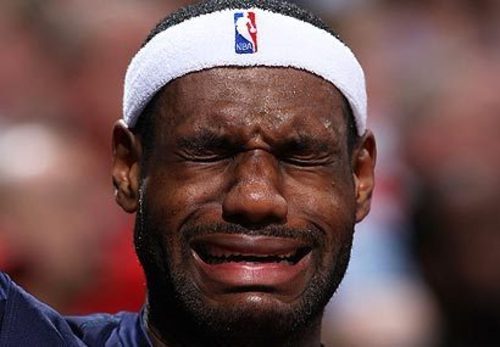
Our Long, National Nightmare of Not Being Able to Hate on LeBron is Over
NBA owners and players have reached a tentative agreement and if all goes well, play should resume on December 25th.
It’s a Christmas miracle!
Pitching is such a vital part of the game, as far as winning is concerned.
On most teams the set up man has become more valuable, on others not so valuable.
Something to keep in mind — it’s raining lightly. The infield could be very wet on ground balls.
What is a drop and drive pitcher? He is a guy who drops and drives. Very simple.
So by guessing right you might have guessed wrong.
Giambi walks too much. He’s always clogging up the bases with all that walking.
As a new day begins in New York, the sun sets in Hawaii.
If football is a game of inches then baseball is a game of inch.
If that ball had more elevation, it would have been a home run.
If the double play is a pitcher’s best friend, what is a fielder’s choice? An acquaintance?
It’s better to have a fast runner on base than a slow one.
One thing about ground balls. They don’t go out of the ball park.
The reason we call that pitch up and in is because the arms are attached to the shoulder.
He wears his hat like a left hander!
Any ball that goes down is much heavier than any ball that stays on the same plane.
The blood on his sock looks exactly like Oklahoma!
You don’t want to use too many statistics. The ones that apply to a July or August game won’t be relevant on Saturday.

NBA owners and players have reached a tentative agreement and if all goes well, play should resume on December 25th.
It’s a Christmas miracle!
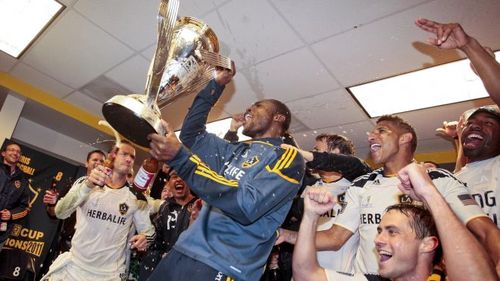
The Dodgers may be bankrupt, the Lakers and the Clippers may have had their season cancelled, the Kings may be… whatever the Kings are. But there is one bright spot on the Los Angeles sports scene: the Galaxy!
No, seriously, look it up. The Los Angeles Galaxy. They’re an MLS franchise.
MLS. Major League Soccer. It is too a real thing.
The Los Angeles Galaxy won the MLS championship yesterday, 1-0, over the Houston Dynamo1.
Goddammit, yes, Dynamo. Like “Oilers” was any better. What the hell is wrong with you, Houston?
The point — you were totally expecting a plural there, weren’t you? — came an hour and a quarter into the game, when someone apparently kicked the ball into a net or something. Someone probably did that “Goooooooal!” thing and the players probably ran around a bit, like there hadn’t been enough of that nonsense over the previous 72 minutes.
Soccer may be the most popular sport in the world, but saying “American Soccer” is a lot like saying “Croatian Basketball.”
To me, as a suburban white guy who was last interested in soccer twenty-five years ago when I played AYSO, the end of the MLS season means two things:
It means that David Beckham will be leaving L.A. Beckham is a soccer player who last made news five years ago when, um, he came to L.A. Oh, sure, he’s also Mr. Sporty Spice, a model and the reason that Keira Knightley exists, but ultimately the loss of a one rich, chiseled guy in Los Angeles isn’t statistically significant.
More importantly, it means that L.A. has a championship, and it’s for a game that’s pronounced “football” more often than not. We may not have a football team, but we’ve got a football championship.
Suck it, Green Bay.
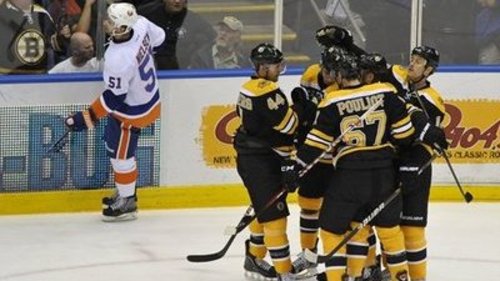
I went to the Islanders game last night at the Nassau Coliseum. I thought it would be great night. They were playing the Stanley Cup Champion Bruins, it was Eddie Westfall night and the team had just come off a much needed win against the Canadiens. I expected a packed house, lots of noise, a good time.
I ended up being a stranger in my own home. The Coliseum was packed with Bruins fans. Everywhere I looked, black and yellow. Bruins jerseys, Bruins jackets, Bruins t-shirts. We went up to our seats (last row, a section away from Loudville) and were immediately swallowed up in the sea of Boston fans around us.
The “Let's go Bruins!” chants started early and when Patrice Bergeron scored the first of Boston's six goals at about seven minutes into the first period, the arena exploded in cheers.
I was mortified. It was an awful feeling, to be sitting in your own arena watching your local hockey team and the visiting team's fans have more of a presence than the home team fans. I expect this at Islander/Ranger games. That's a New York/New York game and there are thousands of Ranger fans living on the Island. But a Boston game? To be drowned out and overwhelmed by their fans felt disgraceful.
I love the Islanders. I've been an Isles fans since their inception. I've been with them through awful times and amazing times. Basement finishes and four Stanley Cups. Recently, I've stuck with them through the threat of the team moving. I campaigned for a new arena, I got people to go out and vote in a referendum to build a new Coliseum and keep the Islanders here. I shed tears at the thought of losing my team to Kansas City or Quebec or even Brooklyn.
Now? I don't care. Let them go. Long Island does not deserve a hockey team. Not even this losing team. If your team has so little support that the visiting club's fans outnumber your own fans, you don't deserve a team. If you can't get off your ass and get to a game against the Stanley Cup champions on a mild Saturday night in November when they are honoring a local legend, then don't cry to me about how the Islanders are going to leave Long Island.
There are reasons teams desert their cities. Lack of support is a big one. When people don't show for games, when there are empty seats or seats filled with the colors of the opposing team, when you don't give a crap that the arena is a crumbling embarrassment, that's when team owners start to seriously look at other options.
I wonder how the Islanders players felt last night when the Coliseum sounded like it might as well have been TD Garden. I wonder what it's like to be on your home ice and feel like a visiting team. The Islanders may not be a great team right now. They may not even be a good team. But they are a young, promising team and if the fans can't come out and show their support and give the team a little morale boost, then we might as well give up the hope that the Islanders will stay here right now.
I never thought I'd say this but, let them go. Let them go to a place that's starving for hockey. Let them go somewhere the fans will come out at night to cheer their team on. Long Island doesn't deserve an NHL team. Not even a 5-9 team.
[image from nesn.com]
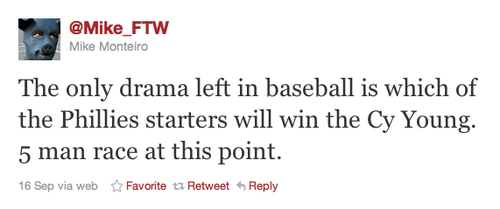
Two months is a long time. A lot can happen. Your favorite ball club, for instance, can be humiliated in the playoffs by a team that would barely go on to win — if the term can be used — the most error-prone and quickly-forgotten World Series in living memory. Your much ballyhooed bullpen can fall on its collective face. Your spectacularly inaccurate predictions can be forgotten.
Thank God for Twitter.
Clayton Kershaw, of the sad-sack Los Angeles Dodgers, is the National League Cy Young winner for 2011, receiving 27 of 32 first-place votes, and scoring 74 more points in the balloting than an also-ran named Roy Halladay from some mascot-driven novelty franchise back East.
In fact, you could combine Halladay’s score with the third-place finisher (Cliff Lee — didn’t he used to pitch baseball?) and they’d just barely edge out Kershaw.
A lot of hype has been directed at various strutting bullpens this past season, but in the end the guy who got it done was a 23-year-old from a barely-.500 team that nobody was paying attention to. He beat Tim Lincecum four for four, pitched a perfect All-Star inning, and won 12 of his last 14 starts. But you could mention his name to some random blow-hard and they’d fire back, “Who’s that?”
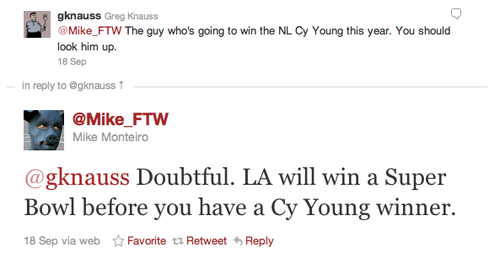
Really looking forward to that Super Bowl win, once we get a football team.
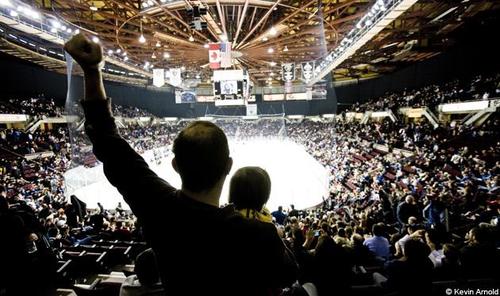
Monteiro asked if I would write an article helping him understand hockey. I said “understand it or enjoy it?”
So now I'm going to teach Mike how to enjoy hockey. Because you don't really have to fully understand something in order to enjoy it. I mean, no one understands what “Wake up the cake, it's a lake, she's kissing me” means but they still for some reason buy Chili Peppers albums. So I believe Mike can learn to enjoy hockey without me going into the intricacies of offsides and icing and plus/minus ratings.
All you really need to know is this: There's a puck and there are five guys on the ice (not counting the goalie) for each team and it is the job of those guys to work together to get that puck past the opposing goalie into the net. When they do that, the red light goes on and everyone cheers and some ten second clip of an awful rock song plays on the PA system.
Just like the beloved sport of baseball, there are beer and hotdogs and players with giant egos and teams in financial distress. But unlike the beloved sport of baseball, hockey is a game that needs to be watched. You can read a book while you are watching baseball. You can vacuum the living room, play Angry Birds or enjoy the intimate company of a loved one while a baseball game is on. Chances are, you won't miss much. You can't do that with hockey because it moves too fast. And therein lies the enjoyment.
Hockey is breathless. Oh sure, there are stops in plays (see the aforementioned icing and offsides, as well as tv timeouts), but when the play is on, it's a blur of motion. It's speed, finesse and grace peppered with dashes of brutality and violence. Not necessarily the violence of two grown men dropping their gloves to pummel the crap out of each other (made to happen less often thanks to Brendan Shanahan's inglorious hunger for power and might), but the ferocity of checks against the board or the brutal beauty of a mid-ice check. It's the sound of a slap shot. The thrill of seconds winding down in a close game as your team buzzes around the net. It's the shorthanded goal. The sound of a puck hitting the crossbar and the collective gasp of the fans.
But that is what you are supposed to enjoy. How do you enjoy it? You go to a game. Don't start trying to get a feel for a game by watching it on tv. You need to be there. You can sit up high with the rowdy fans chanting insults in between gulps of watery beer or you can sit down low, close enough to the action to see sprays of ice flying around. Doesn't matter. Whatever makes you comfortable.
You just watch. The puck drops and you follow the action. You watch the sticks, the skates, the rush of players all headed in the same direction. You watch the defensemen hang back or play the point, you watch the forwards skillfully maneuver their way around the net like a biker weaving around traffic on the Long Island Expressway. You keep your eye on the goalie, all padding and painted helmet, contorting himself like a gymnast to keep that puck from going into the net.
There's a lot going on in hockey. You're not watching one player at a time taking a swing at a ball and missing when the bases are loaded and the game is important - sorry, having an A-Rod moment there - you're watching everyone on the ice. At once. You've got to keep up with the action. There's no time to be bored. There's no time to be social while the game is in play. You focus, you follow and you become one with the game.
Pick a team. Wear a jersey (Sharks, perhaps?). Get yourself a beer. Forget about rules and regulations for now. Follow the play and if you get lost follow the crowd. Watch what they are watching. Cheer when they cheer. Chant when they chant.You get the hang of the rituals of the game if you just watch everyone around you. It's almost like going to Catholic church; sit, stand, sit, stand. And your will find yourself invoking God and Jesus everyone once in a while. "Oh my god, just shoot the puck, already" or "Jesus Christ, that was a shitty call, ref." But I'm not going to get carried away with the church analogy or you'll never go to a game.
It's easy for me to tell you the things to enjoy about hockey. But I can't make you enjoy it. It has to be in you. That need for something fast-paced, for hyper kinetic action mixed with grace and agility, for the punishing hits and wicked shots. It's not a game for the laid back. Hockey is not a game for someone who thinks a lazy fly ball is exciting. But I can ask you to try it out.
Grab a beer. Just sit back and watch the action unfold. And don't look away until the whistle blows.
Will Bunch, the Philadelphia Daily News:
Maybe putting 45,000 students in one rural town, where the economy is built on a currency of Jell-O shots, isn’t such a great idea after all.
The thought I keep coming back to is this: Throughout this entire horrific, decade(s?)-long saga, not one person in a position of leadership at Penn State — not one — did the right thing, in a situation where doing the right thing required nothing more than honesty and basic human decency.
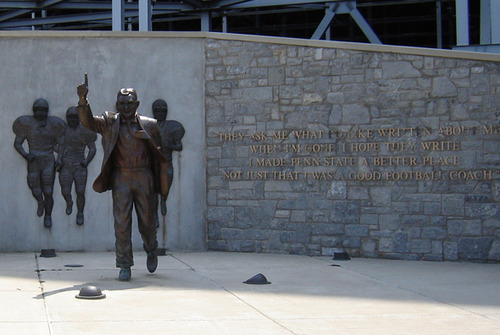
This is the quote beside the Joe Paterno statue at Penn State:
“They ask me what I'd like written about me when I'm gone. I hope they write I made Penn State a better place, not just that I was a good football coach.”
Well, you kind of wrote your own history, Joe. It could have been a different story. It could have been one of accolades and praise, one about your wins, your championships, your role as not only coach but father-figure to the entire university. They would have said grand things about you, Joe. You would have been written about as nothing but a legend, a god among men. A good man.
But that's all changed. And it changed in one instant, in one singular moment in 2002 when circumstances called for you to fulfill a moral obligation to not only a ten year old boy but society at large and you failed to fulfill that obligation. It changed when you did the bare minimum thing instead of the right and honorable thing.
Everyone is talking about tarnished images. There are some saying the board has tarnished your image by firing you. Some are saying the media has tarnished your status. But make no mistake. This was your doing.
They could have written amazing things about you, Joe. Maybe they would write about how you made Penn State a better place. And maybe you did do that, for a while. But as we watch students riot on campus on your behalf, defending your inaction and putting the blame for your firing on everyone but you, I'm guessing that train has left the station. This is what we will remember. This is what they will write:
Joe Paterno was a good football coach. He was also a flawed man who made a terrible decision when it came to the protection of the sports program over the protection of a young boy's health and welfare and unfortunately that decision allowed a man very close to Joe Paterno to continue his abuse of children and that forever put a black mark on the name of Penn State University. But hey, we was a damn good football coach.
That's what they will write about you, Joe.
Nice statue, though.
I have praised Sports Illustrated’s Joe Posnanski before, and now I’ll do it again. He is a fantastic writer, and his post from Sunday encompasses many of my feelings about the Penn State story.
(Tangent: SI refers to this on its homepage as the “Penn State Scandal.” I heard a radio reporter refer to Sandusky’s actions as a “sex scandal.” Guys, a politician lying about something is a scandal. A politician lying about paying a prostitute is a sex scandal. The word “scandal” has been so devalued that it does not do this situation justice. And this is not a story about sex. Rape is not sex. Child molestation is not sex. This is a story about a serial predator harming children. Get it right.)
Anyway.
Posnanski, you see, is in the midst of months of research for a book he’s going to write—a biography of Joe Paterno.
Yeah. That assignment’s gotten a bit of a swerve in the past few days.
But the point of the biographer, the sportswriter, is this: People are unknowable. No biography can truly do justice to the contradictions inside every one of us. As Posnanski writes,
Good people do bad things, bad people do good things, happy people get lost, lost people become heroes. This is the wonderful and depressing and daunting challenge of writing about people. Things don’t always make sense.
Posnanski’s piece is called “Darkness,” and what makes it brilliant is how he frames it. He talks about a high school football coach he used to cover, and thought he knew well. And one day the guy killed himself. And Posnanski couldn’t figure out how he had no inkling about what was going on inside that person’s mind.
We are all mysteries, perhaps even to ourselves. Nothing is simple. Jerry Sandusky fooled a lot of people. Joe Paterno is generally beloved and yet seems to have done a terrible thing and allowed a monster to roam free in Happy Valley, preying on children.
Or as Posnanski puts it:
This thing is so vile, so grotesque, that it is human nature to want everyone to pay. Innocent children were hurt, scarred, and as a parent this is something so horrible that I cannot even think of a penalty harsh enough. There is no way to see this thing clearly now, not for me, anyway.
Darkness.
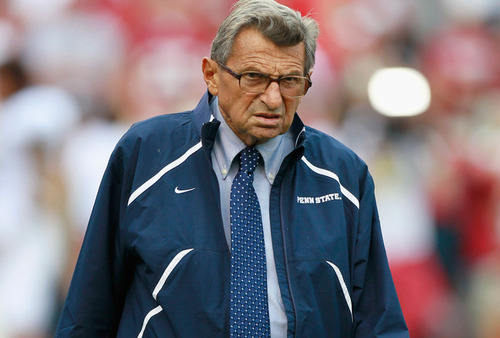
Should Joe Paterno resign? That seems to be the question of the week.
One might ask more pointedly, should Joe Paterno be held accountable for his inaction? I thought about this yesterday as I listened to conversations about the Sandusky allegations, as I read posts and comments and editorials on the whole story, as I watched the opinions unfold on twitter.
I was a little unnerved at how many people were defending Paterno, saying what a detriment it would be to the Penn State program if he resigned, talking about the loss of morale the team would suffer and what a revered hero Paterno is (two people involved in the scandal have already stepped down).
This revered hero was told about a horrible act committed against a ten year old and he dropped the ball on it. Yes, he reported it to someone at Penn State. But he didn't do what he should have done. He didn't follow up. He didn't alert the authorities. He just told someone about it and then let it go. That's unforgivable. While Paterno claims he “met his responsibilities” I think there are many of us out here who would beg to differ, or at least have him defend what he thought his “responsibilities” were when confronted with evidence of inappropriate activity by Sandusky at the Penn State campus. Regardless of the fact that he didn't know the “specifics” of the incident, he knew it involved Sandusky doing something that made the witness “distraught” and that right there should have been a red flag.
Alleged is a tricky little word, isn't it? It's a modifier writers use to stay on the good side of slander. Even when the evidence is damning, even when the grand jury findings are sickening, revolting and sad, we have to use the word alleged because, innocent until proven guilty. So I'll keep using the word alleged in front of Sandusky's crimes because I have to, but I'm damn near ready to send this guy to hell.
There's this culture surrounding sports where people are put on pedestals, held up as untouchable, infallible. Even when they do wrong (see, Kobe Bryant, Michael Vick, Ben Roethlisberger) excuses are made, forgiveness is quickly bestowed and alleged victims are forgotten. People want what is best for their team, at all costs. They want victories. It doesn't matter if the person helping them get those Ws is an upstanding citizen or a bottom feeder of society, a win is a win is a win. Bad things are easily forgiven if it means a championship banner.
When the whole Catholic church sex abuse scandal erupted, the pitchforks and torches came - rightfully so. People were calling for resignations of everyone involved, even criminal culpability, from the Pope on down. Anyone who turned a blind eye to the abuse of young boys, anyone who knew of the allegations but didn't report them, anyone who let things slide under the radar needed to be held accountable.
So how is this any different? How are some of the same people who called for the church to make heads roll defending Joe Paterno's actions (rather, inaction)? Well, Popes and bishops and priests don't win football championships, that's why.
Yet here we have the same situation, the systematic abuse of young boys at the hands of a trusted community member and there were people who knew, who could have put a stop to it as far back as 2002, but didn't. Mike McQueary, the grad student who witnessed the abuse (who is now on the coaching staff) is one of them. Joe Paterno is another. Telling someone about the abuse and then letting it go wasn't enough. A ten year old kid being raped is not something you let go. It's not something you don't report to the police.
Will forcing Paterno's resignation mess up Penn State's season? Sure it will. But anyone who puts the value of a winning college football season over righting a wrong has skewed priorities.
Florida State coach Bobby Bowden said: “He's the number one guy in college coaching and everybody looks up to Joe. hen something like this occurs to his program all it just says is, ‘Joe, hey, you're just like all of us. You have problems like all of us.'"
Yea. Not many people have the “problem” of not having reported to the police their knowledge of the sexual abuse of ten year old boy.
There are moral victories and there are sports victories. Only one of them is important in the long run.
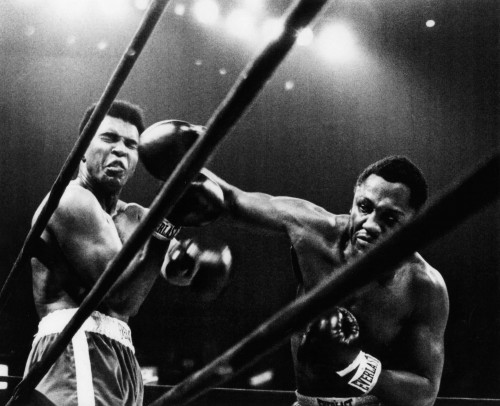
“Joe Frazier would come out smoking. If you hit him, he liked it. If you knocked him down, you only made him mad.”
—George Foreman

Twenty years ago today we thought Magic Johnson was going to die.
And not in a “someday” kind of way. But quickly, and unavoidably, and painfully. In 1991 you did not live with HIV, you died of AIDS. And AIDS was a strange disease which affected homosexuals, drug addicts and Haitians. We weren’t sure where it came from. And we seemed all too eager to look down on those who were afflicted by it. Ronald Reagan seemed to believe that you could catch it by mentioning it.
So when the best ball-player of his generation announced, in the prime of his life, that he had HIV it was a late-coming wake-up call. How the fuck does a member of the Showtime Lakers get HIV?!? This was a disease shady people got. Not Magic! And yet there it was.
But Magic didn’t die. He persevered. He spoke out. He continued his life. He even came back and played for a while! Most of all, he made people face the issue. Magic was the turning point. Am I glad he got it? Fuck no! I wouldn’t wish that shit on anyone. But I admire the courage with which he carried himself. No, still carries himself. He made a shitty situation a teachable moment.
And thanks to the advances of science and medicine he is still with us.
Stay healthy, Magic.

I’m not ready to talk about a baseball season that ended with Tony LaRussa and Mark McGwire hoisting a championship trophy quite yet. But somehow, no matter how shitty a season ended, baseball has a way of pulling you back in for another year of misguided hope and wretched despair.
Yesterday’s news that Jim Thome had signed a one-year contract to return to the Phillies was the beginning of that road back. Where will Thome play? Can he still field? Who cares? We’ll figure it out later.
It’s time to stop pouting. Keep your glove oiled.
The world is full of bad sports journalism. There used to be an entire site devoted to it, but the guys who wrote it stopped because they were too busy doing things like developing NBC sitcoms. Sheesh.
As a college student I loved reading the L.A. Times, but it’s the home to an awful lot of bad sports journalism these days. Most specifically, they pay Bill Plaschke, the worst sports columnist in the world. (Yes, folks, I did include Jay Mariotti in that sample.)
But here’s a piece by someone else, Bill Dwyre, that takes the cake.
On the day after he won the war and gave the Dodgers back to Los Angeles, Bud Selig took on an entirely new persona.
Toast of the town.
Now I admit, Frank McCourt is about as bad an owner as you could invent. And he has been forced to sell the team largely because MLB and Bud Selig pressed the issue. This much is true.
As of early evening Tuesday, there was no deal to have Frank McCourt agree to sell the Dodgers at auction. But in New York, negotiations were percolating.
And where was Selig? He was sitting in a banquet room at the Westin Bonaventure Hotel in downtown Los Angeles, there to make the keynote address at a function sponsored by the Boy Scouts of America, Los Angeles Council. It was called the Good Character Gala, and Selig’s topic was “Character, Leadership and Values.”
Could it have been more fitting?
Maybe a little. In that Bud Selig’s motivation to “save” the Dodgers was largely because, should McCourt have succeeded in strip-mining the franchise, the value of his industry and the value of all his owner bosses’ franchises would also have dropped.
But also in that Bud Selig was the guy who approved the sale of the Dodgers to McCourt in the first place!
There were warning signs all around McCourt. He was rejected as an owner of the Red Sox. His finances were questionable. He was highly leveraged. And despite all that, Bud Selig, the steward of the game who shows Character, Leadership, and Values decided to push McCourt as owner.
“There comes a time in your life as commissioner,” he said, “when you have to do things, even when there is no great percentage in the certain result. I did what had to be done. It was a gamble I had to take.”
What a gamble! The delightful Jonah Keri details how delightful at Grantland:
But the issue really is a national one, with McCourt’s malfeasance throughout his years owning the Dodgers threatening to have an impact that extended well beyond Southern California. Had Major League Baseball not stepped in, a dangerous precedent would have been set: Convince the league to let you buy a team, and you can do anything you want to it. Anything.
Basically, Selig had to step in. He was not a hero for doing so. He was doing his job. And cleaning up the mess he made himself. Keri again:
From the start, it was clear that McCourt didn’t have anywhere near enough money to buy the Dodgers; at the very least, he didn’t have the will to spend it. Instead, he bought the team using $421 million in debt. In a sense this is really MLB’s fault, more than McCourt’s: Baseball’s owners will raise holy hell to prevent a new owner from buying into the club if they think he might shake up the status quo. They apparently have no such qualms about owners violating the debt-to-equity ratio limits that are supposed to protect the league from financial disasters.
Bud Selig and MLB saddled the Dodgers with a terrible owner who almost destroyed their baseball team, but at the last minute when there was no other alternative, they made the moves that were required of them.
Back to Dwyer’s cow patty:
“The Dodgers are a great franchise, have been a great franchise,” Selig said. “I expect the sale process to be vigorous, with multiple bidders.”
Indeed. And for that, Los Angeles clinks its glasses to the man of the hour, Bud Selig.
Yes, let’s let the people of Los Angeles clink a glass for Bud Selig. What a hero.
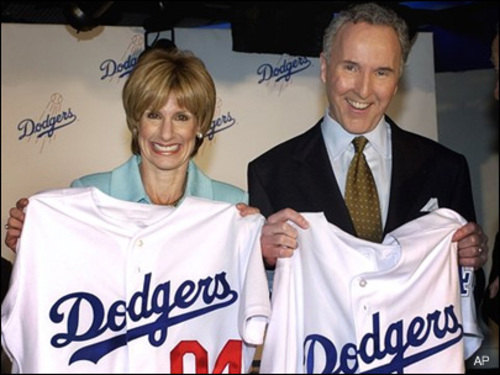
Frank McCourt, scumbag owner of the L.A. Dodgers, is reportedly negotiating his exit from the team.
Bill Shaikin at the L.A. Times reports that McCourt will agree to sell the team, and in return “will get some control over the sale.”
For those not paying attention, McCourt is going through a divorce and has no money. So he’s tried to mortgage his team’s future by selling future Dodgers TV rights in order to pay his bills. At the end of the process, the Dodgers would be an empty shell with very little value… something that Baseball Czar Bud Selig does not want, because it would reflect poorly on the value of all other baseball franchises.
Of course, Bud Selig’s the guy who thought this Boston parking-lot attendant would make a good owner for one of the proudest (if evil) franchises in baseball. It’s hard for me to root for any party in this scenario: McCourt? Selig? The Dodgers? But if I have to choose, I choose to root for the game of baseball, which will be better off without a jerk like McCourt in it.